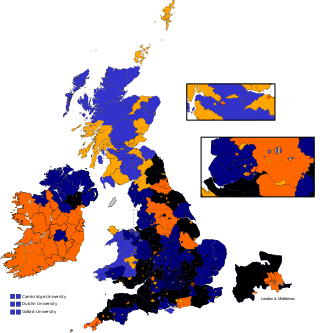Top Qs
Timeline
Chat
Perspective
East Cornwall (UK Parliament constituency)
Former parliamentary constituency in the United Kingdom From Wikipedia, the free encyclopedia
Remove ads
East Cornwall was a county constituency in the House of Commons of the Parliament of the United Kingdom. It elected two Members of Parliament (MPs) by the bloc vote system of election.
Remove ads
Boundaries
In 1832 the county of Cornwall, in south west England, was split for parliamentary purposes into two county divisions. These were the East division (with a place of election at Bodmin) and West Cornwall (where voting took place at Truro). Each division returned two members to Parliament.[1]
The parliamentary boroughs included in the East division, from 1832 to 1885 (whose non-resident 40 shilling freeholders voted in the county constituency), were Bodmin, Launceston and Liskeard.[2]
1832–1885: The Hundreds of East, West, Lesnewth, Stratton, and Trigg, and in the hundred of Powder, the eastern division, i.e. the parishes of St Austell, St Blazey, St Dennis, St Ewe, Fowey, Gorran, Ladock, Lanlivery, Lostwithiel, Luxulyan, Mevagissey, St Mewan, St Michael Caerhays, Roche, St Sampson's, St Stephen-in-Brannel, and Tywardreath, and in the hundred of Pydar, the parishes of St Breock, Colan, St Columb Minor and St Columb Major, St Ervan, St Eval, St Issey, Lanhydrock, Lanivet, Mawgan, St Merryn, Padstow, Little Petherick, St Wenn, and Withiel.[3]
Remove ads
History
In 1885 this division was abolished, when the East and West Cornwall county divisions were replaced by six new single-member county constituencies. These were Bodmin (the South-Eastern division), Camborne (North-Western division), Launceston (North-Eastern division), St Austell (Mid division), St Ives (the Western division) and Truro. In addition the last remaining Cornish borough constituency was Penryn and Falmouth.
Remove ads
Members of Parliament
Election results
Summarize
Perspective
Elections in the 1830s
Elections in the 1840s
Eliot was appointed Chief Secretary to the Lord Lieutenant of Ireland, requiring a by-election.
Eliot was elevated to the peerage, becoming 3rd Earl of St Germans and causing a by-election.
Elections in the 1850s
Elections in the 1860s
Elections in the 1870s
Elections in the 1880s
Robartes was elevated to the peerage, becoming Lord Robartes.
There were 86 spoiled papers, which was considered an unusually high number.[16]
Remove ads
See also
References
Wikiwand - on
Seamless Wikipedia browsing. On steroids.
Remove ads

